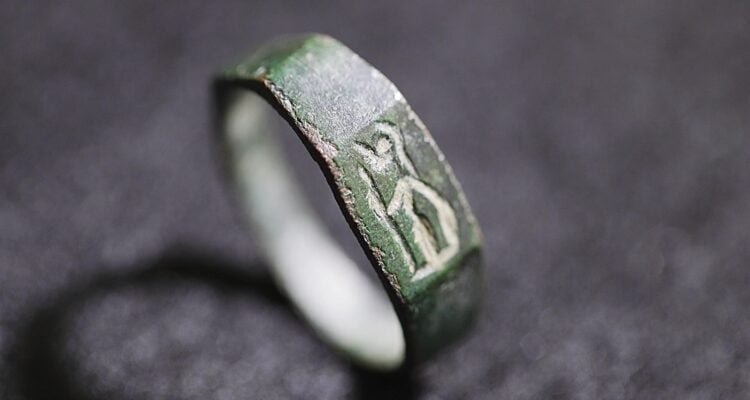Khirbet Shalala, the archaeological site near to where the ring was found, sits on a hilltop in the center of the Carmel Mountains.
By World Israel News
Yair Whiteson, 13 years old, who lives in Haifa, went out for a hike near his home – quality time with his father, who came back after four months serving in army reserves.
While walking near the “ancient quarry” site that lies below Khirbet Shalala (Mishmar HaCarmel Farm) on Mount Carmel, he suddenly came across an intriguing object.
“I am curious about fossils and rocks and love to collect them,” shares young Whiteson.
“While hiking I noticed a small green item and picked it up. It was corroded, and at first, I thought it was just a rusty bolt. I thought about heating it, but then fortunately I understood it was a ring. At home, I saw it had an image on it. At first glance, I thought it was a warrior.”
The family contacted Nir Distelfeld, Inspector at the theft Prevention unit of the Israel Antiquities Authority, who transferred the ring to the National Treasures Department.
It was examined and researched by the Israel Antiquities Authority with the assistance of Prof. Shua Amorai-Stark, an expert on ancient rings and amulets from the Kaye Academic College.
Yair and his family were invited for a tour in the new Jay and Jeanie Schottenstein National Campus for the Archaeology of Israel, and received a commendation for good citizenship.
“On this beautiful ring, preserved in its entirety, is the image of a helmeted naked figure. In one hand she holds a shield, and a spear in the other,” explain Distelfeld and Dr. Eitan Klein, from the Israel Antiquities Authority’s Unit for the Prevention of Antiquities Robbery.
“Yair’s identification of the figure as a warrior is very close to reality. The figure is – apparently, the goddess Minerva from Roman mythology, known also as Athena in Greek mythology. This goddess, who was very popular during the Roman period in the Land of Israel, was considered, among other things, as the goddess of war and military strategy, and also as the goddess of wisdom.”
“The small ring, whose metal is seems to be bronze, probably belonged to a woman or girl during the Late Roman Period (2nd-3rd Century CE),” say the researchers.
“The location of the find was below Khirbet Shalala, sited on a hilltop where there are Roman period farmstead remains and near an ancient rock quarry. There are two burial caves on the quarry’s edge.”
“The ring may have belonged to a woman who lived on this farm. Or, it might have fallen from a quarry worker, or it may have been a burial offering from these nearby graves. There are many possibilities.”
Khirbet Shalala, the archaeological site near to where the ring was found, sits on a hilltop in the center of the Carmel Mountains.
On three sides it is bounded by Nahal Oren, and nearby is Ein Alon, a perennial water source.
The site was explored and documented in the past by the 19th century Palestine Exploration Fund surveyors, by famed Israeli archaeologist Prof. Ruth Amiran, and by a Bar-Ilan University expedition led by Mount Carmel expert Prof. Shimon Dar.
“The ring now connects to data gathered here in earlier excavations and surveys and sheds additional light onto this site,” Distelfeld and Dr. Klein conclude.
Do You Love Israel? Make a Donation - Show Your Support!
Donate to vital charities that help protect Israeli citizens and inspire millions around the world to support Israel too!
Now more than ever, Israel needs your help to fight and win the war -- including on the battlefield of public opinion.
Antisemitism, anti-Israel bias and boycotts are out of control. Israel's enemies are inciting terror and violence against innocent Israelis and Jews around the world. Help us fight back!
